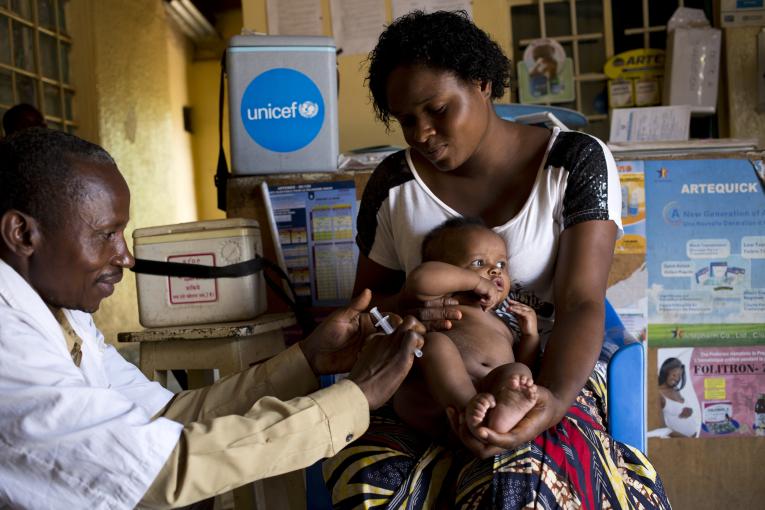News
Declining vaccination rates in the Democratic Republic of the Congo could lead to resurgence in deadly diseases

FILE: Health worker Nsiri Lowoso vaccinate three month old Zoe Nukandila as his mom, Arellete Ytshika, hold him, Saturday 10 Nov, 2018 at the Centre De Sante Le Rocher Maternity in Lubumbashi, Democratic Republic of Congo. He was vaccinated against measles and rubella, tetanus and polio.
(Photo: UNICEF/UN0328788/Prinsloo via UNICEF/Website)
KINSHASA/GENEVA/NEW YORK, 15 May 2020 –The reduction in vaccination rates currently being reported in the Democratic Republic of the Congo (DRC) will leave children in the country at increased risk of contracting deadly diseases such as polio, measles and yellow fever, UNICEF warned today.
The decline in the first two months of the year was likely due to established challenges such as poor cold chain systems, low coverage and stock supply. However, the DRC’s Expanded Programme on Immunization (EPI) is now facing a new challenge which will almost certainly worsen the situation: COVID-19. Health workers conducting routine vaccinations do not have access to adequate equipment to protect themselves, caregivers and children from the coronavirus. Parents are reluctant to attend vaccination sessions for fear of exposing themselves and their children to COVID-19.
In January and February 2020, there was a decline in vaccination coverage compared to the same two months in 2019. The coverage of vaccination against all the recommended early childhood diseases (hepatitis B, diphtheria, tetanus, whooping cough and Hib) has decreased between 8 and 10 per cent, while poliovirus vaccination coverage rates have declined by 8.
4 per cent for IPV and 5.4 per cent for OPV3. Coverage of other vaccines against chickenpox, measles, yellow fever, pneumococcal disease and rotavirus has decreased between 4.5 and 1.5 per cent.
When converting the percentages to numbers, the figures are alarming: 86,905 children have not received the oral polio vaccine; 74,860 children have not received a dose of the tetanus-diphtheria-whooping cough-hepatitis B-Hib3 vaccine; 107,010 have not received the yellow fever vaccine; and 84,676 children have not been vaccinated against measles.
“If this downward trend in immunization coverage persists, it will erase the gains made over the past two years in tackling deadly vaccine-preventable diseases such as measles,” said Edouard Beigbeder, UNICEF Representative in the DRC. “The larger the number of unvaccinated or under-vaccinated children, the higher the risk of disease outbreaks, and this will only strain an already overburdened health system.”
In a country where only 35 per cent of children aged 12-23 months are fully vaccinated before their first birthday, the stakes are high. The DRC could potentially lose its polio-free certification and could see a resurgence of measles and yellow fever epidemics. This could have a devastating impact on vulnerable children in areas affected by conflict and insecurity, or those who live in remote parts of the country.
UNICEF urges the Government of the DRC to launch catch-up campaigns and intensify immunization activities across the country to reach all children with life-saving vaccines. Increased vaccine supplies and consumables to administer vaccines are needed, as well as personal protective equipment for health workers. The organization also urges international donors to sustain the government’s immunization efforts by committing generous multi-year support.





















